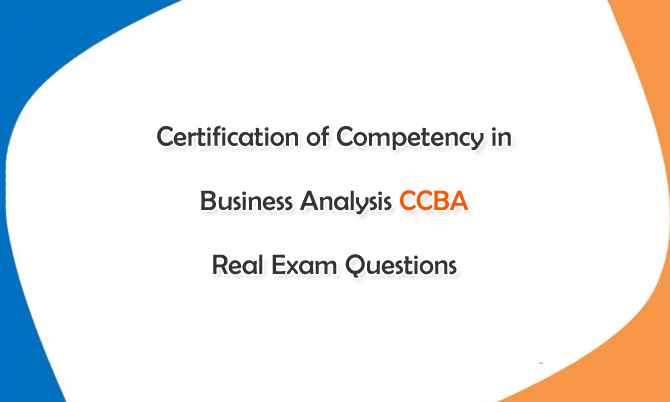Certification of Competency in Business Analysis certification is a significant step for professionals seeking to demonstrate their expertise in the field, which acknowledges individuals who possess a strong foundation in business analysis practices. To take CCBA exam, you must meet specific criteria, including a minimum amount of business analysis work experience, professional development hours, references, and adherence to the code of conduct and terms and conditions outlined by the IIBA.

IIBA CCBA Exam Format
The CCBA certification caters to a diverse range of professionals, including those with an ECBA designation, Product Managers, Non-BA consultants, Trainers, and Hybrid Business Analysis professionals. This inclusive approach acknowledges the varied roles and responsibilities within the realm of business analysis. IIBA CCBA exam comprises 130 multiple-choice scenario-based questions, drawn directly from the BABOK Guide (Business Analysis Body of Knowledge). You'll have three hours to complete the exam, which is administered in a computer-based format.
CCBA Certification of Competency in Business Analysis Exam Topics
CCBA Certification of Competency in Business Analysis exam topics cover the following details.
1. Business analysis planning and monitoring 12%
2. Elicitation and collaboration 20%
3. Requirements life cycle management 18%
4. Strategy Analysis 12%
5. Requirements analysis and design definition 32%
6. Solution Evaluation 6%
IIBA CCBA Exam Preparation Tips
The following preparation tips are useful for you to pass Certification of Competency in Business Analysis CCBA exam.
Study the BABOK Guide: The BABOK Guide serves as the primary resource for the CCBA exam. Thoroughly review each Knowledge Area, understand the underlying concepts, and familiarize yourself with the techniques and best practices outlined in the guide.
Enroll in Training Programs: Participating in formal training programs or workshops led by experienced instructors can provide valuable insights and enhance understanding of complex concepts. Look for accredited training providers that offer comprehensive CCBA preparation courses.
Practice CCBA Real Exam Questions: Since the CCBA exam predominantly features scenario-based questions, practicing CCBA real exam questions is essential. This not only helps in reinforcing theoretical knowledge but also improves critical thinking and problem-solving skills.
Collaborate with Peers: Engaging in study groups or online forums with fellow CCBA aspirants can facilitate knowledge sharing and provide a supportive learning environment. Discussing concepts, sharing study materials, and seeking clarification on doubts can be immensely beneficial.
Share IIBA CCBA real sample questions are available below.
1.A business analyst (BA) is working on an effort to upgrade a system to take advantage of new technology. Most of the end users with the business knowledge and IT staff with technical knowledge of the system are no longer with the company. What can the BA evaluate to better understand the extent of the effort?
A. Benefits of upgrading the system
B. Communication platform to be used
C. Number of business areas impacted
D. Collection of performance measures
Answer: A
2.A business analyst (BA) is working on a project that has a number of stakeholder conflicts and issues. The BA is finding it difficult to resolve the conflicts and issues effectively. What should the BA do to prevent a similar situation in the future?
A. Plan business analysis governance
B. Verify requirements
C. Perform stakeholder analysis
D. Validate requirements
Answer: C
3.A key stakeholder has requested an extensive range of performance measures for a replacement workflow system. A business analyst (BA) has decided to work closely with the stakeholder to validate the performance measures requested. The BA will be ensuring that the performance measures:
A. are ether qualitative or quantitative measurements, but not both.
B. align to industry benchmarks gathered for similar solution implementations.
C. are written in the correct format. using the agreed standards and terminology.
D. align with other measures within the broader context of the solution.
Answer: B
4.A project to replace a financial system uses a waterfall methodology. Initially, meetings with the project subject matter experts (SMEs) were positive. As the project progressed through the requirements and design phases, the SMEs attended fewer meetings, resulting in a delay to the project build phase. What should the business analyst (BA) have done to prevent the delay?
A. Selected a different project methodology
B. Requested new SMEs participate in the project
C. Modified the governance structure
D. Engaged in consistent collaboration
Answer: A
5.A new contract requires a thorough level of documentation to be developed and maintained with planned phases of reviews and authorized sign offs. Which approach fits this contract?
A. Waterfall
B. Agile
C. Scrum
D. Iterative
Answer: A
Preparing for the CCBA certification exam requires dedication, commitment, and a structured approach. By understanding the requirements, leveraging appropriate resources, and adopting effective preparation strategies, aspiring business analysts can increase their chances of success. Earning the CCBA designation not only validates one's proficiency in business analysis but also opens doors to exciting career opportunities and professional growth.
